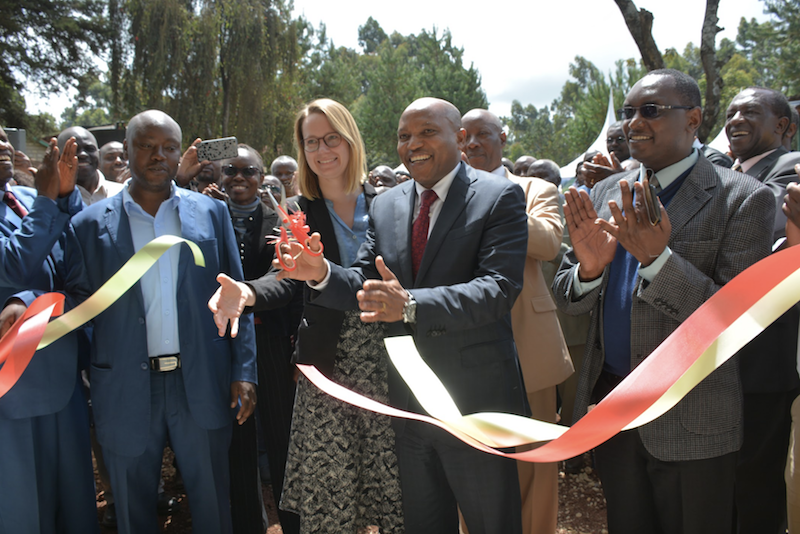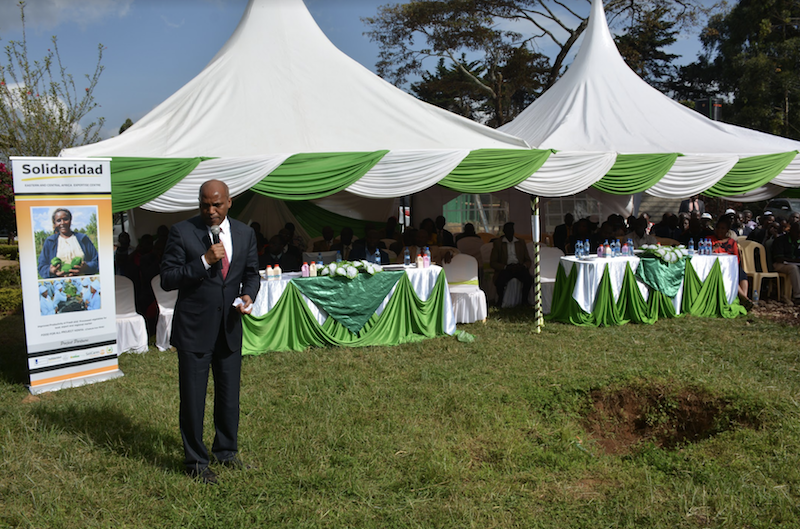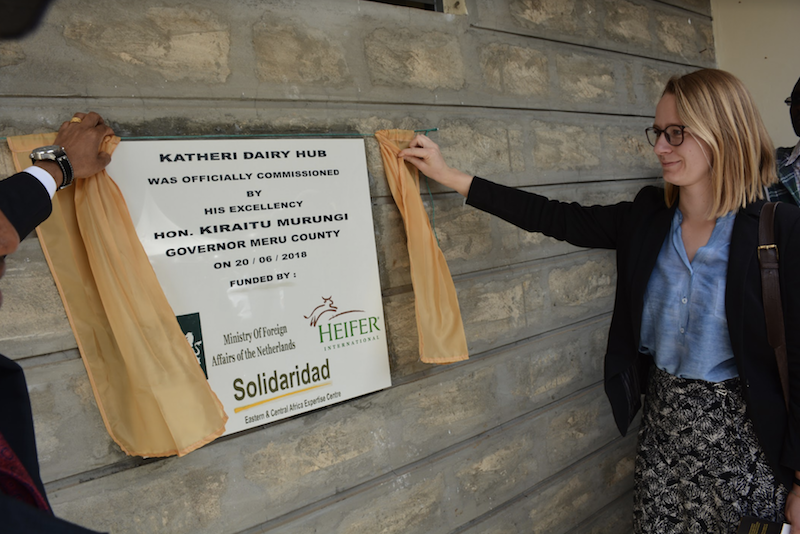
Over this period, over 3,000 households have received training related to business development and agricultural improvement. Benefiting households have also received education on ICT platforms for data management, market information and extension education
Food for All Project
So far, the five-year Food for All Project has brought together five dairy cooperatives with the capacity to handle 500,000 liters of milk daily to ensure aggregation. Katheri dairy cooperative has attracted membership of 3,000 smallholder dairy farmers, and receives a capacity of 8,000 liters of milk daily from its 1,000 active members.
On June 20, 2018, in partnership with Heifer International, Solidaridad set up an additional Dairy Hub with capacity for 5,000 liters to collect milk delivered by smallholder farmers affiliated to the Katheri Dairy Cooperative. At the launch, Katheri Cooperative members broke into song, dance and ululations.
Launch of the Katheri Dairy Hub in Meru County
The launch of the hub brought to life the locals dreams of making Meru county the leading national milk producer in Kenya. During the launch, the county Deputy Mayor vowed to match this with another dairy hub of the same capacity to help aggregate more milk from the area.
Addressing the Katheri cooperative members during the launch of the hub, The Solidaridad Food for All Project Manager – Mr. Francis Shiovnje said that the development of the dairy hub is intended to improve informal markets and market actors’ capacity to upgrade value chains.

Supporting Keny'a National Food Security Agenda
The Food for All Project’s vision is aligned to the national food security agenda that will alleviate the recurrence of incidences of starvation, famine, food insecurity, undernourishment, and food loss. Speaking at the event, Shiovnje reiterated the importance of the dairy sector in poverty alleviation. He pointed out the sector’s vital role in contributing towards food and nutritional security as well as increased household incomes.
Challenges in the Kenyan Dairy Sector
Speaking at the same event, Mr. David Ojwang’ – the Director of Programmes from Heifer International noted that the main challenge facing the dairy sector in Kenya is the high cost of production. He said that the cost of production is affected by the high cost of animal feed, inputs and cost of electricity. Seasonal milk production fluctuates in Kenya and poor milk quality are challenges facing the sector.
Deputy Governor of Meru County Supports Initiative
In Kenya, general milk processing areas tend to have poor physical infrastructure in terms of roads, electricity, milk handling and storage facilities. Addressing smallholder dairy farmers during the launch of the Katheri Dairy Hub, Hon. Silas M’ntuchiu – the Deputy Governor of Meru County, lauded the Dutch government for working through development partners such as Solidaridad and Heifer International to complement the county government’s efforts.
He noted that the established dairy hub was an innovative approach to cushion the dairy farmers against milk loss, and a business center would link farmers to various service providers to scale up their efficiency. In support of the work done by development partners, the Deputy Governor said that the Meru county government would set up another dairy hub with a daily milk capacity of 5,000 liters, to help aggregate more milk from the area that would otherwise go to waste.

Support From The Dutch Embassy
Ms. Rose Makenzi – the Food Security and Water Policy Officer from the Dutch Embassy, noted the success of the country’s dairy sector depends on how well challenges such as poor infrastructure, overlapping government and private sector roles, land tenure and use, agricultural extension and innovation are addressed to ensure smallholders benefit.
She encouraged the county government to develop progressive policies that support smallholder farmers to contribute towards economic growth. Makenzi said that participation of smallholder farmers in markets can contribute to higher output and income growth. She said that business development approaches should be aimed at all value chain actors, including smallholder farmers so they are able to strengthen their link in the value chain.
The Kenyan Dairy Industry
The dairy industry in Kenya is an important player in terms of economic and nutritional aspects. Kenya’s estimated milk production is about five billion liters annually. The dairy production sector is characterized by a huge number of small-scale farmers who make up 70% – 80% of the country’s total production. This industry accounts for 14% of the agricultural GDP and 6-8% of the country’s GDP. The dairy industry generates an estimated one million jobs at farm level, an additional 500, 000 in direct waged employment, and another 750, 000 jobs in support services.
Learn more about Solidaridad's dairy programme here.
